New England's longest river, the Connecticut, runs from Quebec to long Island Sound.
Jeremy and I set out to paddle it all, running into countless adventures and never actually finishing it.
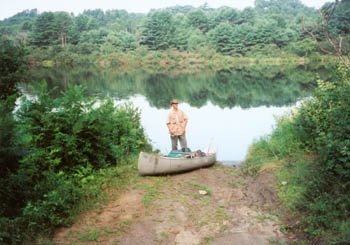
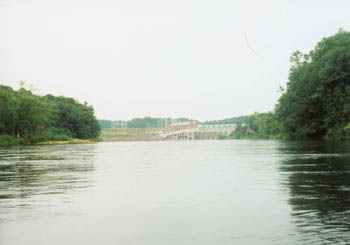
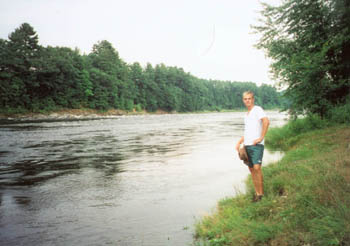
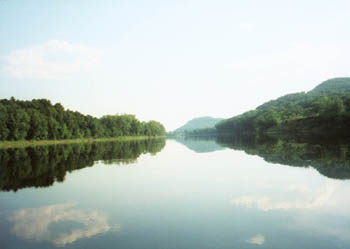
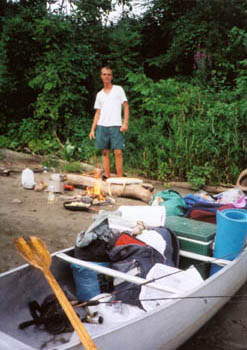
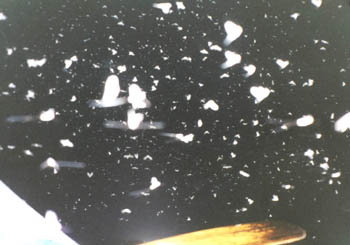
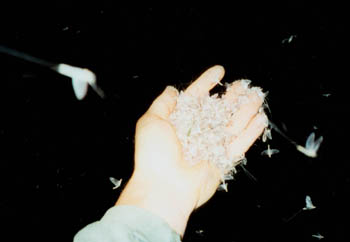
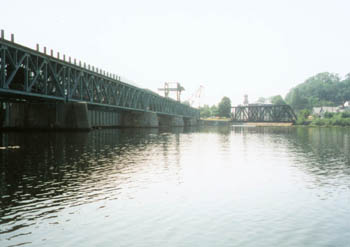
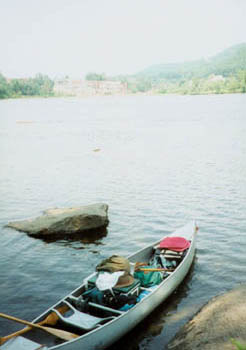
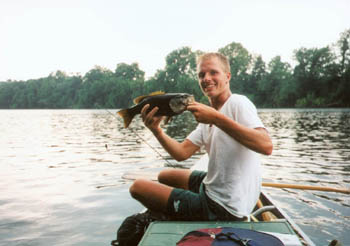
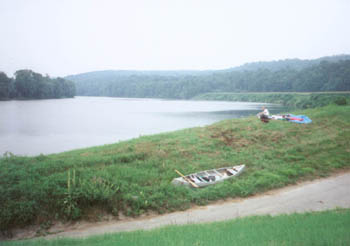

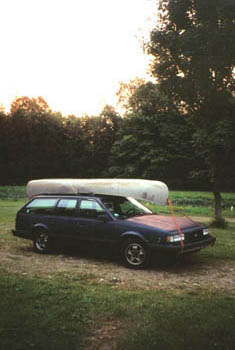
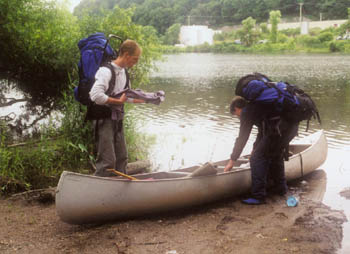
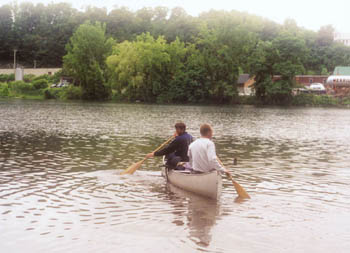
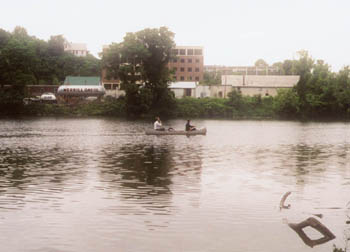
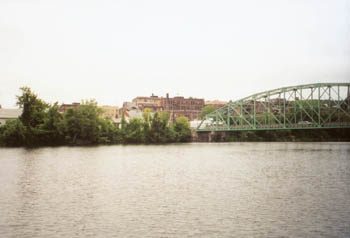
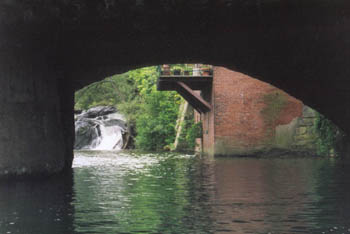
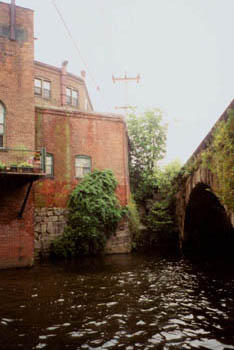
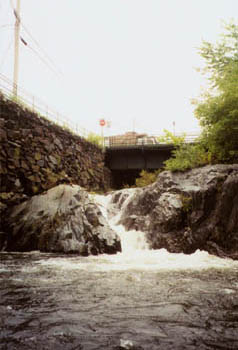
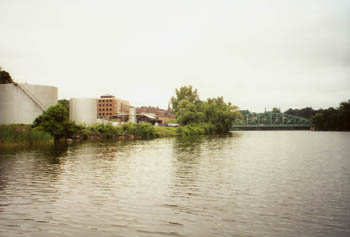
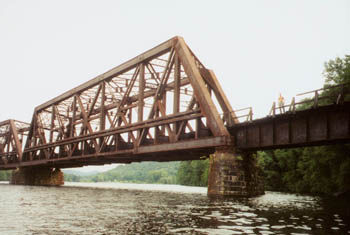
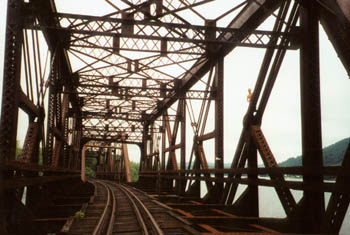
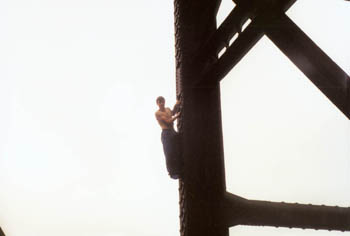
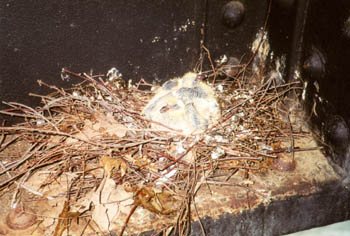
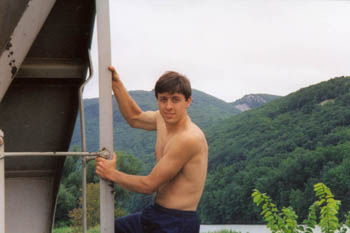
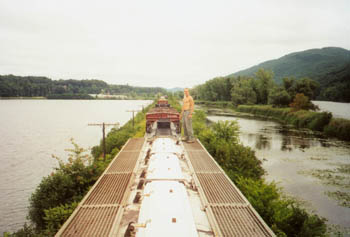
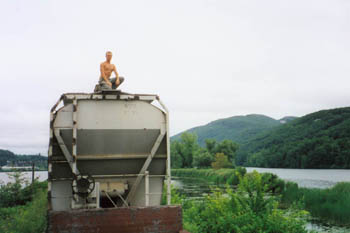
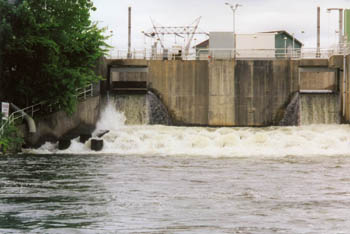
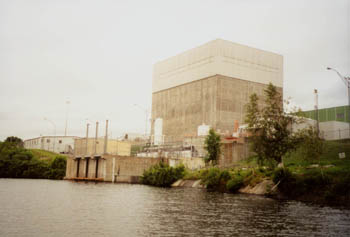
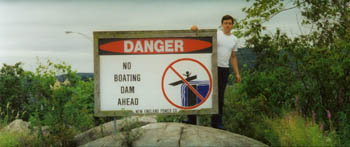
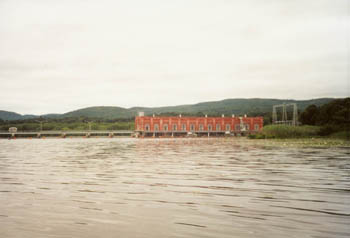
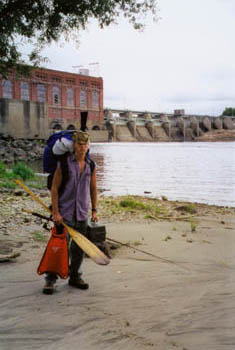
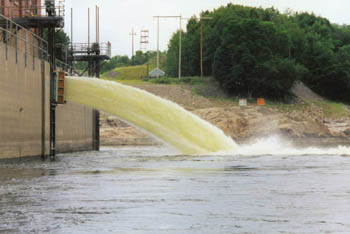
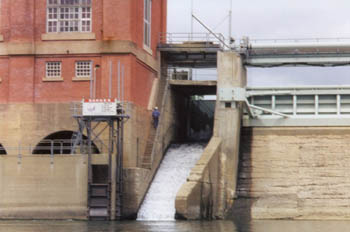
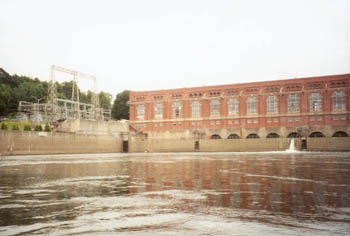
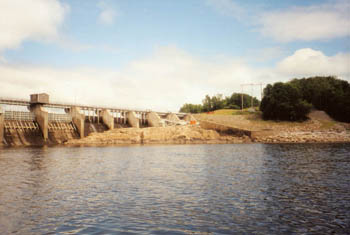
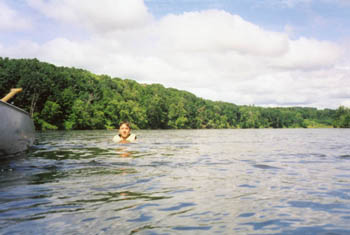
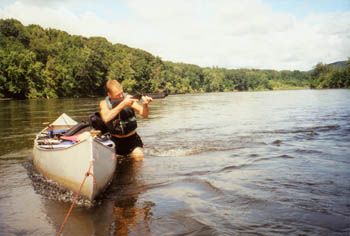
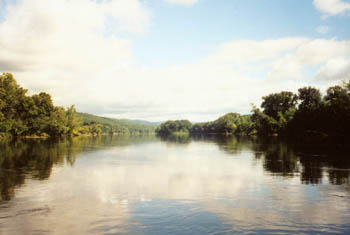
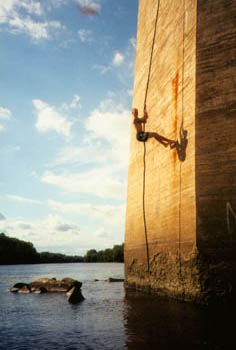
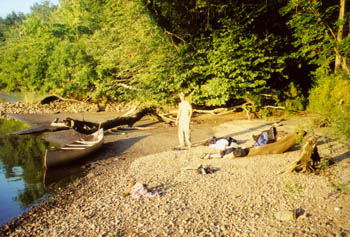
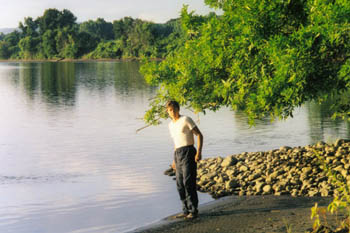
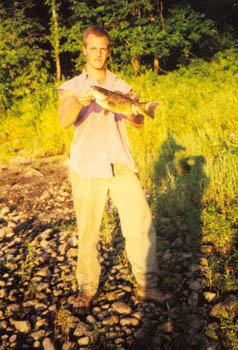
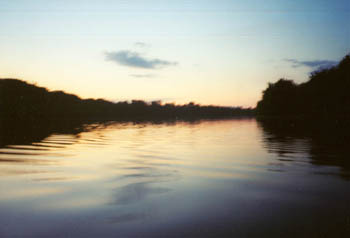
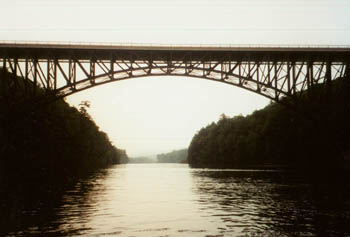
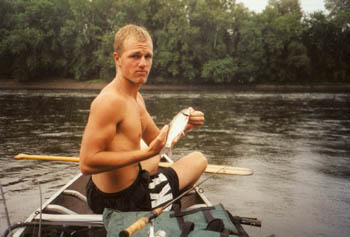
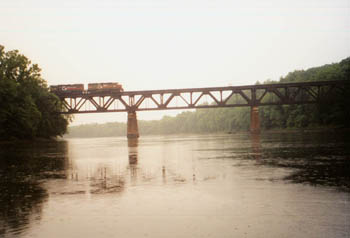
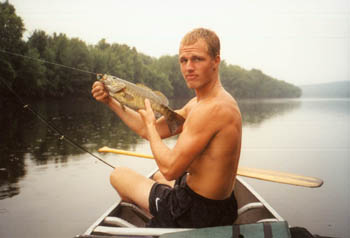
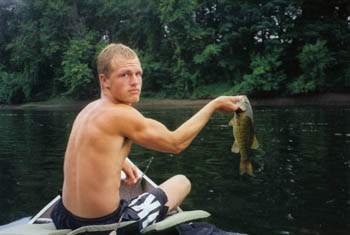
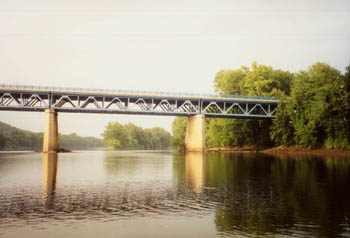
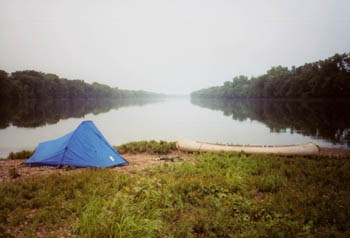
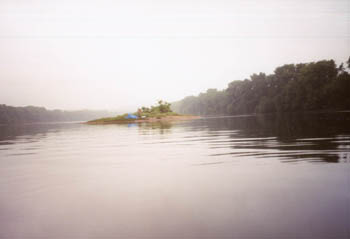
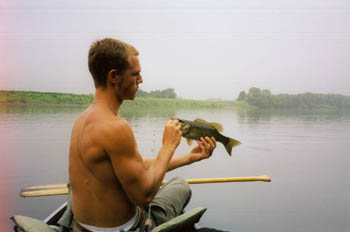
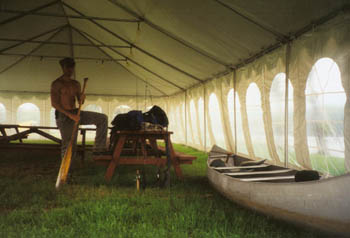
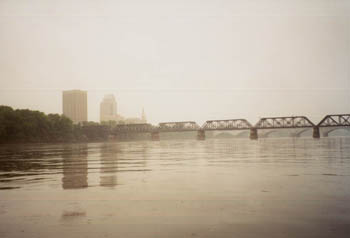
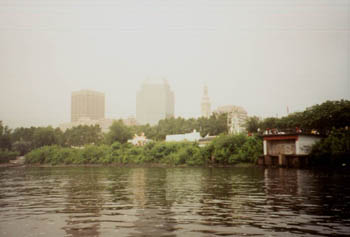
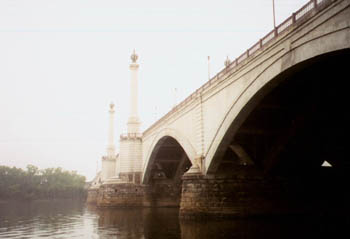
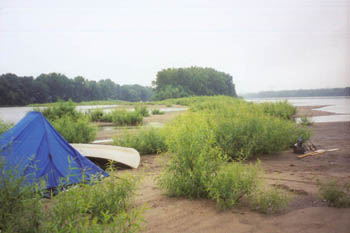
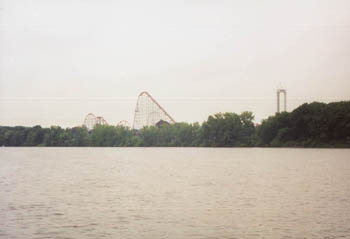
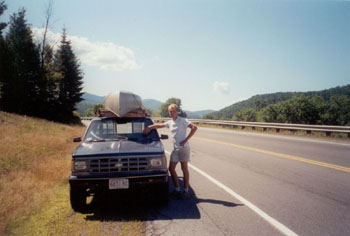
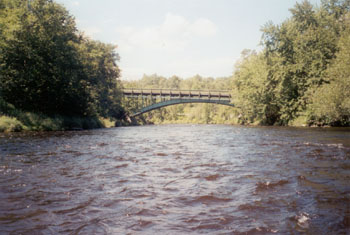
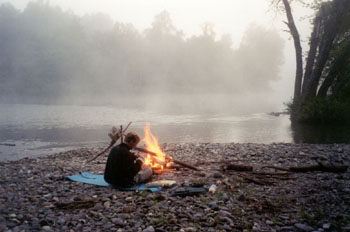
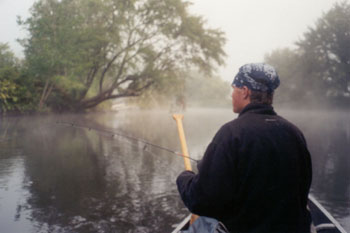
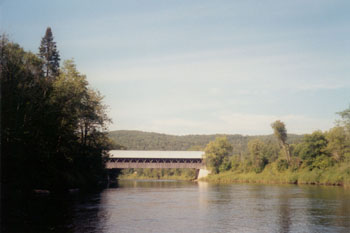
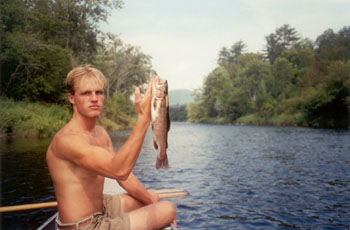
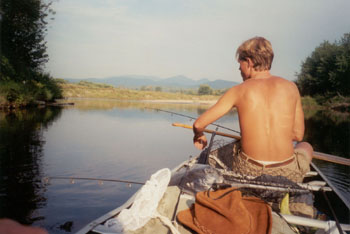
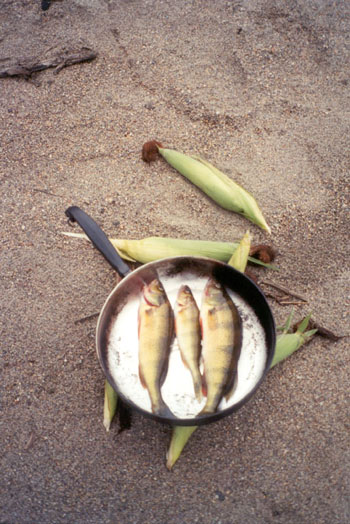
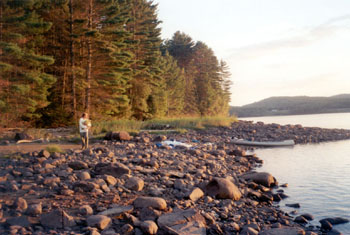
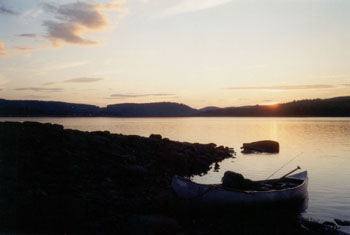
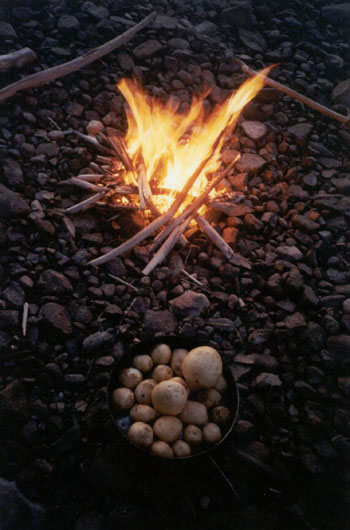
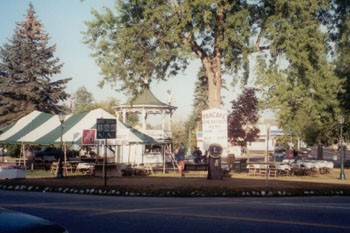
By late August of 1999 the endless weeks of work had taken their toll on me. It was time for a break - time to reclaim the free days of the summer. A few weeks before, while Jeremy and I were speculating on trip ideas, I suggested that we do some canoeing on the Connecticut. The lure of the river was too much to resist. Who knew what was around the bend beyond the bridge? We resolved to find out. We had done some rafting on the Deerfield, using a little seven-foot long rubber raft for the class I-III water, and we rather liked that aimless drifting in the sunshine. So, one Wednesday night we loaded his truck with food and gear and tied the fifteen-foot aluminum canoe securely on the rack. At 4:30 the next morning we drove an hour east to the river and turned northward. By midmorning we decided to look for a place to put in and ended up in the town of Lyme NH, a short distance from Highway 91. With a New England highway map, a blue tarp, sleeping gear, a few gallons of water, a cook stove, pot, and a boat full of food, we headed downriver.
The first miles passed slowly in the sluggish current, but we were in no hurry. We passed rolling farmland and occasional residential houses. There was a large bridge at Hanover, New Hampshire. Light rain started to fall and when we stopped to cover our gear, I collected some large snails to add to the diner menu. We stopped at Wilder Dam for lunch and then carried the canoe and gear a few hundred yards around the dam. Numerous green crayfish jumped off the shore as we approached, and we tried unsuccessfully to add them to our food stores. The water below the dam ran swiftly, and for the next eight hours we covered many miles, reaching the bridge at the town of Windsor VT shortly after dark.
The run was marked by several close calls. The water was shallow, often only three or four feet deep, and we sped along at great speed. The swirling water traveled with us, at the same speed, so looking down it seemed as if we were stationary and the rocky bottom was rushing upriver. It was an eerie and nerve-racking sight. While running through some ripples for extra fun we nearly collided with a large rocky ledge. The current there was so strong that we would have been unable to recover our gear for several miles, at which point most of it would have sunk or disappeared. We moved on cautiously and carried the boat past several hundred yards of class IV whitewater, the Sumner Falls we later learned, where numerous kayaks bobbed about below the churning waters. Downstream of this we paddled into a sheltered cove to watch two bald eagles in a tree. Nearby, we pulled a plastic-wrapped bundle from a sand bar and found it to be full of clean dry clothing. We stopped to cook dinner on a peaceful section of the river where the grass was tall and wildflowers bloomed. The snails were a bit gritty, but otherwise rather good. We headed on downriver and finally pulled out well after dark when the current quickened again, fighting against the amazingly strong tug of the water to round a point and lay out our sleeping bags on a grassy knoll above the river. Fighting heavy current in the dark is a thrilling experience. We watched a distant thunderstorm with some anxiety, having left the tent at home in favor of a tarp, but the rain held off for most of the night and biting insects never bothered us.
By morning the water level had dropped by more than a foot; it was regulated by releases from the dam. It was good that we got to run the rapids with high water, because even then some sections were very shallow. I discovered the reason for the great force of the current as we rounded the point the night before: A sand bar channeled the top foot of water into a narrowing passage that became shallower as it rounded the point, forcing the water to speed up as it passed. We moved down the river under clearing skies, but our pace was much slower without the aid of the current. We stopped often to fish but there were no bites at all until the end of the day, when Jeremy caught a smallmouth bass. It was added to our dinner that night along with two crayfish we captured at our lunch stop. It was a beautiful warm day, and we went for a swim and relaxed in the sunshine. Late in the afternoon we encountered heavy northerly winds that created gigantic waves coming upstream on straight sections of river. I guessed that some were fourteen or fifteen inches crest to trough; they began to fill the boat with water. We stopped for dinner on a narrow sandy beach beside a cornfield and cooked up another feast. The river became as smooth as glass as the sun set, and the clear skies indicated that we would have another nice night. We paddled onward after dark, amusing ourselves by howling at the coyotes and making all the noise we pleased in the middle of the dark, empty river. To our great amusement, we soon had what sounded like eight or ten dogs howling with us from one of the scattered houses.
As we moved on, we gradually became aware that there were many flying insects in the air. There appeared to be a white fog ahead and at the river banks, and eventually we got out the big flashlight to investigate. The instant Jeremy turned it on we were amazed to see millions of white mayflies flying upriver. They were thick in the air across the entire river, at least a quarter-mile wide, and they swarmed to the light, falling in a thick mat on the water and filling the boat an inch deep. We drifted on, amazed at this sight, and for forty-five minutes the flies continued to stream past. We swept them out of the boat in handfuls but they worked their way into everything. They began to thin out slowly and then were gone just as suddenly as they had come. A few lone flies circled around, and then all was quiet. The bodies littered the water like snow, extending across both stream banks like snow. Every square inch was covered and our boat cut a path through them that extended into the darkness behind us. We continued to paddle silently through the flies for many miles, and when we pulled out to sleep at a cornfield near Charleston NH they drifted past for hours in the slow-moving current.
We slept well that night, and in the morning we were off to an early start. Clusters of mayfly carcasses drifted in the eddies but for the most part they were gone. Lunchtime found us paddling into the town of Bellows Falls, the first real town thus far on the river. There was a dam, so we tied off under a bridge and ventured into town to stock up on food and call home to let worrying parents know we were still alive. We returned with armloads of food, but it only lasted a few hours. We reluctantly pushed off and paddled to the edge of the dam, which was exposed in the low water. The river beyond it was gone, and only a mass of tumbled boulders remained. Puzzled by this, we ducked under the buoys and headed down the power plant canal in search of a way around. Some sort of carnival was going on beside the river there, and all the children turned and pointed at us. Everybody waved, and we laughed at how we had become a public attraction. We were surrounded by a mass of pipes and railings near the power plant when we turned back. The channel was lined with chain-link fence, and there was no way out. As we passed by the low railroad bridge, an old train that was some sort of tourist attraction passed by, and every passenger smiled and waved at us from the windows. Children walking by on the streets above pointed and said to their parents, "Look at the boat!" As we passed by the carnival again, a larger crowd looked on, and a photographer looking at art exhibitions started snapping pictures of us. We must have been quite a sight to the townspeople, wearing our wide-brimmed hats and paddling a canoe loaded with camping gear and fishing poles and through the chain-link fence lined canal in the heart of an industrial town.
The dam presented a real problem, since it was a two-mile carry along the highway to the water below the dam. We pulled up the gear and had relayed it two hundred yards when a guy in a truck offered to give us a ride. We happily accepted, and minutes later watched in awe as the long miles of sun-baked highway passed by, high above the boulder-strewn streambed. We put in below the dam and paddled to the opposite shore to bask in the sunshine, swim, and eat more food. Several hours later we moved along downriver. The water was shallower but the current was not as strong as it had been below the first dam. There, the fish were biting. We wrestled several feisty small mouth bass in, including one that weighed several pounds, but released them all.
Dinnertime found us at a sharp bend in the river between Walpole and Westmoreland, where we pulled out beside another cornfield. Here the mosquitoes came in great clouds, the first time we had seen them on the entire trip. Dressed in our head-nets, we cooked up a delicious meal of pasta with a tomato-vegetable sauce. As darkness fell we saw some thunderstorms moving past to the north, but we remained dry. It had been a long day so we decided to turn in for the night. Our efforts were unsuccessful, however, and we tossed and turned inside sticky sleeping bags fighting the whining clouds of mosquitoes. Around 1:00 AM we took to the water, and a few hundred yards later had escaped from the bugs. We continued onward, paddling slowly past mile after mile of uninhabited shoreline. There was little to guide us since skies were cloudy, and there was a real possibility of becoming disoriented and paddling back upstream. Several hours later we became unbearably tired and slept in the canoe for an hour and a half. There was no current in the river, and when we awoke it was beginning to get light. We had spun around and drifted upstream a few hundred yards, so it took me several minutes to remember where we were and which way was downstream.
We corrected the course and found that after our night's journey we were within easy reach of a take-out at Brattleboro, so we finished up the extra pasta from the night before and continued downstream. We stopped for a break at a large concrete storm drain and I ventured inside with the big flashlight. I climbed thirty feet up inside a huge cylindrical chamber deep within the hillside and peered into the network of drainpipes before returning to the river. We pulled into the city around noon and tied off in a hidden cove. Wandering through town, we eventually found a phone to call home for a ride back north to the truck. We explored some of the stores on our way back to the river and then pushed off once again. Amid the bustle of traffic and boats we paddled into inlets and coves to try our luck at fishing. The fish bit frequently, and we fished around until a marine patrol boat arrived and started showing interest in our unlicensed fishing. Escaping around an island into shallow water, we beached the boat and began to pack up. The river had been our home for more than three days, and we were reluctant to leave it but thankful that once home we would get a good night's sleep. Then my dad arrived and we stashed the boat and headed northward for an hour and a half before arriving at our starting point. The distance by road was 85 miles; we were surprised at how far we had come. We returned with the truck, stopping in Bellows Falls to check the newspapers for pictures of us, but they were not published with the art fair article. After securing the canoe on the rack, we headed home.
The last weeks of summer passed quickly and I often wished that we were still on the river. We began to make plans for the next leg of the river, hoping to eventually make it to the ocean. Despite the rain and bug-ridden nights, the pleasant memories of the freedom to drift as we pleased, fish when we liked, paddle by night and sleep by day, and explore the endless riverbanks remained fresh in my memory.
That was River Trip 1999, canoeing the Connecticut River from Lyme NH to Brattleboro VT. ~Mike
A year later...
Two weeks after returning from Canada we decided it was river time once again, so Jeremy and I and I packed our gear, made a quick grocery run, and got a ride from my mom to Brattleboro VT on a cool, cloudy Friday morning. On the water at 7:30, we spent some time fishing along the shoreline but caught little. The city looked particularly run down and trashy against the gray sky and we soon headed downstream, our departure speeded by an encounter with an enormous dead rat submerged in the shallows. We pulled to shore at an old railroad trestle a few miles downriver to climb around on the now rusted and overgrown structure. There was a nest with two young birds, most likely pigeons, in the shelter of one of the huge steel beams. We scaled the massive iron ties to perches sixty feet above the water, returned to safety, and then scrambled back down the slope to the boat. A short distance downstream we came to shore again to board a freight train stopped along the tracks. We climbed atop the cars and jumped from car to car, feeling very much like cowboys chasing cattle rustlers in the Old West. A sighting of a person farther down the tracks prompted us to make a stealthy exit, and we paddled on and fished downriver.
The Vermont Yankee nuclear plant soon came into view, but dozens of "No Trespassing, No Public Access" signs lined the bank and we decided to stay in the boat and amuse ourselves by spotting security cameras perched every fifty feet along the fence and playing in the churning whitewater pouring out of the cooling pond. The nuclear reactor had been removed and the plant shut down, but nuclear waste was still stored inside the plant. We watched a woodchuck scurry along the shore and then paddled on to Vernon Dam, a short distance away. A sign on a rock at the center of the channel had a comical warning with a person in a boat going over a dam. A line of orange buoys blocked access to the dam, but we ducked under it and paddled to the edge (which was above the water level) to see what lay downstream. Returning to shore, we followed a flock of geese down the main road until they circled back to the water through a power substation. The 1/4-mile carry was easy enough despite our heavy load of food. At the far side we ate a tasty lunch of tuna fish with barbecue sauce on cinnamon raisin bread. That's typical fare for two guys buying the cheapest food that tastes good. There were a couple of interesting characters fishing on the rocks above the discharge tunnels. When we told them that we were planning to paddle at least to Holyoke they replied, "The Connecticut River goes down that far?"
The sun had come out by this point, and after paddling thrtough some whitewater and investigating a fish ladder we headed downstream. The current was quite swift, and when we stopped to swim we found ourselves being swept rapidly away from where the canoe was tied on shore. It was fun to drift lazily along like this, bobbing up and down in our life vests, but we spent twenty minutes fighting our way upstream back to the boat. We collected our gear, tied the boat to our life vests, jumped back in, and drifted on downriver. The sensation of walking in quickly flowing chest-deep water seemed like walking on the moon; we could take giant leaps while barely touching the ground and with much less effort than when walking on dry land. We stopped the boat in waist-deep water with great difficulty and skipped BBs off the water for a while with the gun. When the water became deep again we climbed into the boat and paddled on into Massachusetts. Evening found us at a gravel bar cooking dinner in the orange glow of the setting sun. It was very peaceful except for the few minutes Jeremy spent reeling in a smallmouth bass. We ate a pound of pasta with tomato sauce and a quart of ramen soup, then chased it with water. As darkness fell we continued on to Munns Ferry, a small camping area a few miles to the South. There we found dry cut firewood, fireplaces, a table, tent sites, and an Adirondack shelter. Two of the four tent sites were taken but we made ourselves at home at the shelter, spreading out our gear inside and pitching the tent on the grass above the riverbank. We soon had a bright fire going with sliced potatoes frying in the pan. A large can of baked beans finished off the evening's feast. Only one solitary mosquito bothered us, and we sat out around the fire until late at night.
The next morning was wet and cloudy again, and we took our time breaking camp and purifying water from a clear stream nearby. We meandered on past the Northfield Mountain pumped storage intake and through the French King Gorge, where we encountered more and more powerboats. It was interesting looking up at the bridges I had crossed so many times and wondered, "Where does the river go beyond the bend?" Late in the morning it began to rain lightly but we didn't mind a whole lot since our gear was packed up and dry. We arrived at Turner's Falls, a seemingly impossible barrier, around noon. The prospect of a three-mile carry to passable water was not looking like much fun so we took our time eating lunch and had just finished packing the food away when a truck pulled up. A guy named Rick hopped out and offered us a ride, and minutes and many miles later we were standing on a beautiful sandy beach below the power plant canal. We promptly set out into one of the more remote stretches of the lower Connecticut; high banks and shallow water kept the river quiet and free of boats. A light rain had begun but we found the fishing to be excellent and hardly noticed the weather. Large fish jumped out of the water all around us in unusual abundance. I spent more time paddling at the stern of the canoe than fishing, but Jeremy reeled in pound after pound of smallmouth bass and whitefish. We didn't care to eat any of them this far south with all the city runoff and industrial pollution.
The sandy 20-foot high riverbanks were overgrown with vines and brush and a band of trees lined the riverbanks. Beyond the trees we saw endless cornfields. Occasionally we passed a house or a bridge, but we didn't find any backyard barbecues or lawn parties as we hoped we might. At dusk we found a small gravel island to camp on and made ourselves at home. It was a setting right out of an adventure magazine, with the tent set on a gravel beach beside tufts of green grass, some low shrubs, a driftwood fire burning bright and the water flowing silently by. The rain had stopped and the clouds broke for a short time before the sun set. As I cooked a dinner of rice and pasta Jeremy reeled in a big smallmouth bass, then cast out again and reeled in an even bigger smallmouth on the next cast. The fishing sure was good! As soon as darkness fell the mosquitoes came in clouds, but this time we simply laughed at their whining antics from inside our bug-tight tent.
The next morning was gray and cloudy as well, no surprise, and we continued on to Northampton. Here the powerboat activity increased, and we battled wakes and light rain as we made our way south. Low on water but unwilling to purify river water at the risk of clogging the expensive purifier cartridge, we stopped at a marina to fill up our bottles and eat lunch. They had a large tent with tables underneath set up for some event, so we carried the canoe inside and enjoyed a dry lunch stop and naptime as the rain came down. We must have looked far from home indeed among the big boats and lots of parked cars. The rain had the effect of quelling power boat activity, and we continued downstream in relative peace to Holyoke Dam. Again the prospects of a carry loomed over us, but immediately after we crossed someone's backyard to reach the sidewalk a truck stopped to offer a lift around the dam. It seems that the best way to hitchhike is to bring a canoe, as ridiculous as it sounds. After a few minutes' drive through town we again found ourselves at a sandy beach beside hydro discharge tunnels. Going upstream we ventured inside one, shining our lights in an attempt to see into the dark recesses of the plant and hoping that the gigantic steel doors would not close behind us.
The river below Holyoke was not as pretty as it had been above, with trashy factories lining the banks and traffic rushing past behind narrow strips of trees. We ran some mild whitewater and then paddled on through smoother water. Dozens of people were scattered along the banks fishing. We saw no fish, and instead amused ourselves by taking shots at the trash on the river banks with our BB gun when there were no people around. Jeremy managed to reel in a mussel, however - it actually closed on the hook and wasn't just snagged; we got a laugh out of that. Evening found us nearing the city of Springfield. We felt out of place below the high-rise office buildings and hotels, paddling a canoe loaded with camping gear and fishing poles and wearing our wide-brimmed hats. There was some sort of carnival in a park along shore, and as we came closer we discovered that it was a Puerto Rican celebration of some sort. There was Spanish music playing, a guy singing "Puerto Rico! Puerto Rico!," and crowds of people. They waved at us and called out "Catch any fish?" "No, not recently," Jeremy replied. A moment later another person called out, "Catch any fish?" "Yeah, lots of 'em." Sure, why not say so? We climbed up underneath a bridge to see if it would be a good place to camp - dry, not far from downtown- until we realized that somebody already lived there. And Amtrak trains roared by every few minutes, and traffic rumbled overhead, and we would have to take turns standing guard with the gun so we wouldn't lose our food. We paddled on.
We got more attention from a small cruise boat passing by as the couples sipped their martinis and admired the city skyline. No suitable (or safe) places to camp appeared for many miles. We passed more people setting off fireworks in celebration of something. Finally we spotted an island a mile distant and made for it. We puzzled over some distant odd-shaped towers lit against the dusky sky before realizing that they were roller coasters and other rides at the Six Flags in Agawam. We camped nearby, on a large sand flat at the end of the island, and dragged the canoe about 50 feet to the highest, driest part of the sand bar, set up the tent among tufts of grass, and dove inside to escape from the mosquitoes. In a lapse from strict camp etiquette, we devoured bagels and cereal bars in the tent, knowing that no mice would be on this lonely sandbar and choosing to swap dinner and breakfast to avoid cooking a meal in the dark, sandy, mosquito infested night.
We awoke well rested and hungry. I pulled the rain fly open and looked out. "Guess what the weather is." "Rain." "Correct." It was another gray morning but dry at the moment. We immediately realized that the dam fifteen miles upstream had released water, flooding our sand spit to within eight feet of the tent. It was a good lesson, for the paddles were lying off to the side and could have been silently floated away without our knowledge. The water was still rising but only very slowly, so we took our time cooking some food and shaking the sand off our gear. Getting the boat back to the water was a much easier matter than it would have been the night before. A mile downstream we found a small creek running past the Six Flags amusement park and paddled in to investigate. The maintenance crews were out preparing for the day. Continuing on in a light rain, we crossed the border into Connecticut a short time later and began to look for a place to take out and call home, but we had entered a wildlife refuge and the riverbanks were empty.
After consultation with the AMC guidebook we stopped to scout a route past Enfield Dam, an old gravel dam breached in several locations. The book said, "the dam ...has been shot by experienced canoeists... but it is not recommended." It didn't look like much more than some mild chop, especially with the unusually high water, so we donned life vests, bungeed everything into the boat, and struck out for the center of the river. The light chop transformed into a raging class II torrent as we came closer, and we shot off a two-foot ledge into a large curler. The boat rode well and I had no trouble keeping us straight, though we took on an inch or two of water and were drenched ourselves. Jeremy, kneeling at the bow, was soaked from the chest down as the boat plunged into the standing waves. We ran another mile of class I raps before locating a boat ramp in Enfield and going ashore. The small gravel lot beside train tracks and tobacco fields seemed to offer little to help us in our return to civilization, but Jeremy set off to make a call home from a house up the road. We communicated by radio until his return. He reported a few chickens wandering along the road, an Amtrak roaring by, and lots of tobacco fields; otherwise, it seemed to be a quiet morning.
In the mean time a number of people had come and gone from the gravel lot where I sat watch over the gear. One strange fellow wandered down in the rain carrying a large white bundle, then stopped and donned the white plastic suit. He stopped to talk for a minute; I said we had paddled down from Vermont. "The river goes up that far?," he replied. The little lot saw much activity, with a patrol car stopping by every half hour or so, the mailman stopping in for a smoke break, people coming and going. We learned from the locals that five people had drowned the year before in the rapids we had just run, and that they were presently looking for another body. A guy had robbed a store the week before, jumped into the river to get away from the cops, and never come up. Too much money in the pockets! The water was unusually high even for the rainy summer, we learned.
Jeremy's brother arrived a couple hours later and we were soon cruising north on interstate 91, passing by all the places we had seen from the river. Sitting in the back of the van on the canoe front seat, I concluded that it was the first canoe ride I had ever experienced at 80mph. Later, home safe and sound, I spent the afternoon attempting to dry and clean my gear. It was a tough job on a rainy day.
That was River Trip 2000, the Connecticut River from Brattleboro, Vermont to Enfield, Connecticut. ~Mike
A year later...
Having just returned from a fantastic six month long internship at NASA's Jet Propulsion Lab in California, I was looking forward to spending the last three weeks of summer in Massachusetts exploring and reconnecting to the home which had been the only place I really knew before I traveled west. Jeremy was working construction six days a week but he could get some time off for a short trip. We had roughly sketched plans to paddle the Upper Connecticut River, continuing a summer activity we'd set in motion two years earlier. Every summer we did another section of New England's longest river. Just days after I arrived we packed Jeremy's truck with a haphazard collection of gear on a Tuesday evening and turned in for a short night's sleep before a 4am departure. It's always good to get on the river early in the morning. The sun rose as we drove north through Vermont on Interstate 91 , passing beautiful little towns shrouded in the morning mist. The miles rolled on by and we made good progress, arriving in St. Johnsbury around 8:00 for breakfast at a small-town diner. We joined the locals sitting at the bar and ate plates of eggs and potatoes and wheat toast for just $2.49 a serving. After wandering around town for a while, acquiring fishing licenses, and looking through a couple of stores, we were on the road again headed for Canada. In Stewartstown we parked the truck in a turnout at the edge of the river just a few hundred yards from the border with Quebec. I put a note on the dashboard that said: "Paddling down the river - be back in a few days." Just above the confluence of Hall Stream and the narrow, fast-flowing Connecticut we dragged the lightly loaded canoe down a steep bank and pushed off into the swift current.
Our first quarter mile on the river took us through raging whitewater that drenched us and filled the boat with water an inch deep. The fish were biting and we pulled in trout, rainbows and brookies and browns. The current was swift and we quickly arrived at a dam we'd seen driving in. We dragged the boat up the west bank, carried it fifty yards, saw our way blocked by a giant hydropower aqueduct, returned to the east bank, dragged the boat up through thick underbrush, down abandoned railroad tracks, along a precipitous concrete retaining wall beside the river, and into the rock-filled water once again. We had to line down to deeper water but then enjoyed miles of swift current and winding river. Six hours later we had a mess of trout in the boat and were hungrily searching for a gravel bar just north of Colebrook where we could camp for the night. There weren't many options for camping along the river. Once we found a suitable gravel beach - a perfect campsite, actually - we built up a fire to ward off the night chill and fry up our trout. Traveling light, we had a frying pan and spatula but no utensils and no sleeping bags. We ate with our knives and fingers, our feet to the fire while stars began to shine overhead and smoke drifted among the leaves. We slept out on foam ground pads under the starry sky, listening to the gurgles and whispers of the water. It got quite chilly and Jeremy kept the fire going all night.
Morning brought more sunny skies and eight good sized rainbow trout by midday. It was a perfect calm morning with warm sunlight and cool mist. A moose watched us pass from the riverbank. Towards noon, we pulled to shore at a spot no different from any other on the steep thickly forested bank and found a fire ring set up right there, not visited recently but curiously ready for our lunch stop. After filling ourselves with roasted corn and fried trout we rode on through wonderfully swift rock-studded river for many hours, Jeremy pulling in trout all the while. It was a fisherman's dream. The hits were almost instantaneous at every cast in one of the first stretches of quick water. We gracefully slalomed the canoe through the boulders and rode the current downstream, arriving in North Stratford mid-afternoon and then continuing on through wide open cornfields to a beautiful gravel bar overlooking the White Mountains. As the sun set, we collected firewood and set up camp. The mosquitoes were worse there and we pitched my tent before dark and then sat around the fire and ate rainbow trout and roasted corn and animal crackers and apples and the last of our plums I'd brought from home. The river gurgled on by all night as clouds obscured the stars. In the trees just behind camp, large animal sounds reverberated. We never did figure out what they were - moose, perhaps.
I awoke early in the morning to raindrops splattering on the tent and scrambled outside to put on the rain fly. The rain continued to fall lightly so we broke camp and moved on in the chilly gray morning. We had no rain gear; things get wet on paddle trips and since it wasn't really important to stay dry in August we'd decided many things just weren't worth the trouble to keep covered. We were moving out of trout territory; instead we hooked a few perch, many whitefish, and a couple of smallmouth bass. The rain stopped midmorning and we were able to make a dry lunch stop for perch and whitefish and corn. There were no people or cars or houses in sight and it was very peaceful, but then as we were packing up to leave again a man suddenly buzzed up out of nowhere on an ancient clattering jet-ski sort of craft that sputtered to a halt on our sandbar. He tried to get it going again but without much success. He wasn't much interested in us so fifteen minutes later we left him making circles in the river with the engine running rough. We paddled onward, not fishing as much since the trout were gone - and, we were getting tired of fish.
Heavy rain returned as we paddled by giant caverns carved out of the muddy riverbank by beavers. We came upon a broken-up dam where heavy class II whitewater roared over the drop. After scouting the run we got out and I lined our boat down alongside the torrent. Thunder rumbled as we paddled by mile after mile of overgrown riverbank searching for another gravel bar to make camp. We had dried out again but heavy rain seemed imminent, and though we had paddled past prime camping spots all day now there was nothing but wet jungle. Twilight faded to thick humid darkness and fog appeared and became so dense that we couldn't see the riverbank with our headlamps even when we paddled close alongside it. Some sprinkles fell but the rain held off, and several miles later we finally pulled up on a muddy sand bar and squished around to set up the tent on the driest patch of dirt we could find.
Morning brought gray but dry skies and we packed up and paddled onward, stopping at a gas station to buy butter for the fish and donuts and pretzels and crackers. Just past town we found a decent gravel bar and cooked up a delicious meal of boiled potatoes with corn and roast corn on the cob. The morning's paddle brought us to the dam at Gilman. Forest had replaced the riverbank cornfields and it was quite beautiful. Loons bobbed about on the water and dove as we approached. We made the short carry around the dam and paddled through a half mile of fast boulder-strewn river to the Moore Reservoir. The remainder of the day we traversed this vast, motionless body of water, finally stopping at a beautiful point overlooking the lower reservoir at nightfall. We boiled potatoes on a hot driftwood fire, roasted corn and apples, and watched the sun set against the northern forest. Some time after dark two young Northeastern Utilities Security guards arrived hiking along shore to inform us that no fires or camping were permitted along the entire thirty miles or so of reservoir along this section of river. They waited until we broke camp and pushed off into the black water with no real plan other than to leave the guards by a way they couldn't follow. We paddled across a bay to the interstate, a right of way we figured might technically be legal for camping, and tried to get some sleep.
At first light on Sunday morning we broke camp, stowed everything of value in a backpack, dragged the rest into the underbrush, and wandered off into the foggy morning along a very quiet Interstate 93. As the sun broke above the scattered clouds it began to get hot, and we hoped that one of the few cars that sped by in small clusters would give us a lift into the first town four miles away. After we had walked a mile and a half a guy in a blue pickup pulled up. He was on his way to hike in the White Mountains and could take us as far as Whitefield. We squeezed into the cab and rode about 15 minutes up the road to a beautiful little town, the classic New Hampshire hamlet if there is such a thing. The town circle was surrounded by a few restaurants, churches, a bank, the Village Gun Store (every town up north seems to have one), a dairy bar, a general store, a video rental shop, and numerous other small establishments each unique to Whitefield. We hopped out of the truck at the town circle, thanked our driver, and made a beeline for the pancake breakfast the Lions Club was setting up. Informed that the food would be ready in a half hour we set off around town and came back once the cooking was under way to fill up on blueberry pancakes. By this time the sun was shining in a clear blue sky and the town was becoming busy.
The breakfast was quite good after days of corn, fish, and potatoes. The town was beautiful but we were pressed for time and after a soon-to-be-discovered clogging incident in the pristine bathroom at a sandwich shop we kept our heads low and got out of town, quickly. The sun was hot and there were no rides for many miles. We were far out in the forest beside spectacular mountain vistas thumbing the cars as they came hurtling by at fifty miles an hour. We arrived at the Dunroamin' Lodge, off by itself miles from other buildings, at around ten in the morning in search of water. It turned out to be a beautiful bed and breakfast run by a young couple who lived there with their baby daughter. They gave us fruit and juice left from the breakfast bar and offered to drive us seven miles into Lancaster, where we would likely get an easy ride. We sat on the back porch looking over the rolling New Hampshire hills while the last of the guests checked out. It felt so good to sit down and relax in the shade. A half hour later we were strolling down the bustling center street of Lancaster among the shops and cafes. Church goers in their Sunday best were arriving in town and we felt quite out of place thumbing rides from them. We were muddy, unshaven, and disheveled and that wasn't making it any easier to get rides. We crossed town and then finally got a ride with a wild blond-haired man. He took us up the road to Groveton, a short ride but one that at least set us on the only road north where all the cars were going the same place we were. We bought a gallon of water and milled about in the shade of a silver maple while the traffic trickled past.
After twenty minutes or so a brown pickup pulled over. The driver offered to take us all the way to Stewartston since he was going farther to Pittsburgh. We happily accepted and were soon cruising past all the crossroads and bends in the river we had passed days earlier. Broken clouds moved in and scattered rain showers battered the truck but we were dry and very pleased about it. We talked about fishing and hiking and boating with our driver and then got off at the wrong crossroads in West Stewartston, a couple miles too far downstream. Not caring too much either way, we wandered on up the road, stopped at the marker for the 45th parallel, only half way to the North Pole though we felt farther north, and made our way on to the truck. Back once again to where the river was narrow and swift, we washed up, put on clean clothes, and drove to Quebec a few hundred yards up the road. The guard asked how long we would be in Canada. "Actually, we were just thinking of driving in for about a minute," Jeremy said. It was a tiny little border station and this was no problem at all. We pulled a U-turn around the customs house and wheeled back into the States, and took off to the west across Vermont. We passed through beautiful hill country right along the border and then turned south on the long journey back to the canoe. Along the way we stopped in little towns, seeking out a good place to eat, but we never found quite what we were looking for so after exploring Island Pond and St. Johnsbury and driving through several other little Vermont towns we maneuvered the truck onto the Moore Reservoir boat ramp (via a restricted access median crossover on the interstate and some speedy turns) and recovered the boat and gear.
On our way south once again, we stopped just a few miles away to pick up a man stumbling along the road with a huge blue duffel bag. As we had been hitching rides all morning we felt that we should return the favor even though he wasn't asking for a ride. He was a black man in his late 20s bumming around the east coast, angry at the world but quite polite and reserved about it. He didn't have much family or friends and couldn't seem to get himself a job, probably on account of his unwillingness to try anything he didn't feel he was made out to do. He had started out in North Carolina, spent some time in New York, "walked up to Maine" and found that place to be scary for some reason (too many trees, I think), and was now trying to get to Maryland. We offered to take him as far as Brattleboro, where we intended to get dinner. It was much farther to Brattleboro than we had realized, and if we hadn't showered in five days, he hadn't in a lot longer. A couple hours later we rolled into town after having listened to our passenger's odd thoughts, discussed music and education and society and talked about our river adventure. We never did figure out just how he was surviving out in the New Hampshire woods, but we gave him some ears of corn. He thanked us and left with surprising haste, disappearing completely with his jacket and half-full blue duffel moments after we pulled aside to park.
Jeremy and I walked into downtown Brattleboro, which is an exciting place often hopping with people on weekend evenings. On a Sunday night many places were closed but we saw a full parking lot at the Riverfront Restaurant we had paddled under so many times before so we decided to try it out. It was an excellent restaurant. We sat on the deck above the river and drank iced tea, ate grilled shrimp, scallop chowder, lemon chicken on penne pasta, and lots of thick crusted bread with butter, all finished off with tasty desserts. Especially after five days on the river, the food was exceptionally good and the service outstanding. At 9:30 we finally left town for the drive home, down US 91 to Route 2 and back along its dark familiar curves to our own deserted towns and empty streets. Our trip cut short by lack of time, we were back to work on Monday. Maybe some day, we'll paddle the next seventy miles from the Moore Dam down to North Thetford. Then we'll do the south section to Long Island Sound, down through the cities with the barges and the riverboats, and the river will be done.
That was River Trip 2001: from Quebec to Littleton, NH, five days of fishing, paddling, and wandering the towns and back roads of Vermont and New Hampshire ~Mike